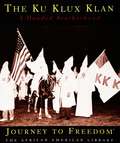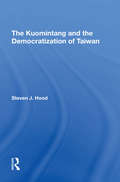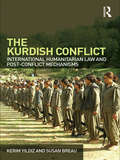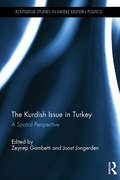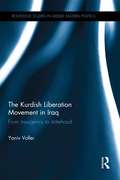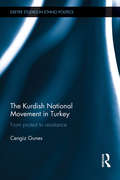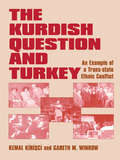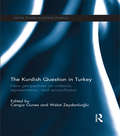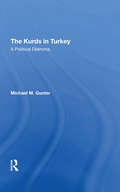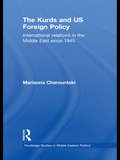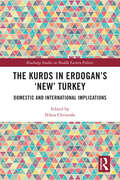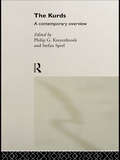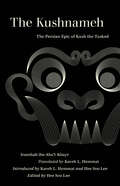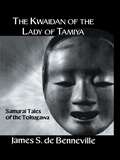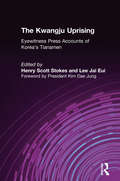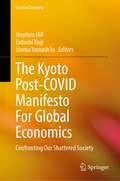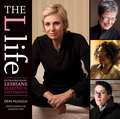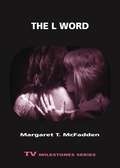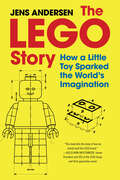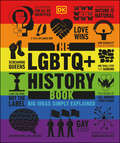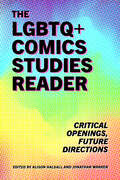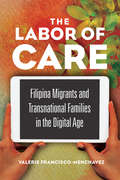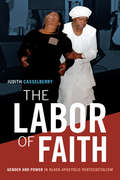- Table View
- List View
The Ku Klux Klan: A Hooded Brotherhood (Journey to Freedom)
by Ann HeinrichsBriefly introduces the origins, history, actions, and impact of the Ku Klux Klan, a hate group that targets a wide range of ethnic, religious, and cultural groups in the United States.
The Kubrick Legacy
by Mick BroderickThe six chapters assembled in The Kubrick Legacy showcase important trends in the evolution of filmmaker Stanley Kubrick’s artistic legacy. In the 20 years since his death an enormous range of information and scholarship has surfaced, in part from the Kubrick estate’s public preservation, archiving, exhibition and promulgation of the auteur’s staggering collection of research materials and film artefacts. These essays from international scholars chart incarnations of the official Kubrick exhibition of extensive artifacts touring the globe for the past decade; the filmmaker’s lasting impact on established authors with whom he collaborated; the profound influence of Kubrick’s use of existing music in film scores; the exponential rise of conspiracy theories and (mis)interpretation of his work since his death; the repeated imitation of and homage to his oeuvre across decades of international television advertising; and the (re)discovery of Kubrick on screen in both documentary form and dramatic characterization. The Kubrick Legacy provides a tantalizing, critical snapshot of the enduring impact and influence of one of the twentieth century’s most enigmatic and consummate screen artists.
The Kuomintang And The Democratization Of Taiwan
by Steven J HoodIs the Kuomintang - the nationalist party of China - the villain it is sometimes portrayed to be? Or is it the embodiment of the political and moral good that partisans have claimed it to be? The party has managed a feat of economic modernization in Taiwan and has become a proponent of democracy, yet its reputation has been marred by brutal acts of repression and ineptitude. Focusing on the role of Kuomintang party elites in the democratization process in Taiwan, this book considers the Kuomintang's evolution from a Leninist state party to a fractious one in a competitive political system.
The Kurdish Conflict: International Humanitarian Law and Post-Conflict Mechanisms
by Susan Breau Kerim YildizThis book is highly topical considering the recent resurgence of violence by the PKK, the incursions into Northern Iraq by the Turkish army and security forces and Turkey's EU accession negotiations. Turkey has become an increasingly important player in Middle Eastern geopolitics. More than two decades of serious conflict in Turkey are proving to be a barrier to improved relations between Turkey and the EU. This book is the first study to fully address the legal and political dimensions of the conflict, and their impact on mechanisms for conflict resolution in the region, offering a scholarly exploration of a debate that is often politically and emotionally highly charged. Kerim Yildiz and Susan Breau look at the practical application of the law of armed conflicts to the ongoing situation in Turkey and Northern Iraq. The application of the law in this region also means addressing larger questions in international law, global politics and conflict resolution. Examples include belligerency in international law, whether the ‘War on Terror’ has resulted in changes to the law of armed conflict and terrorism and conflict resolution. The Kurdish Conflict explores the practical possibilities of conflict resolution in the region, examining the political dynamics of the region, and suggesting where lessons can be drawn from other peace processes, such as in Northern Ireland. This book will be of great value to policy-makers, regional experts, and others interested in international humanitarian law and conflict resolution.
The Kurdish Issue in Turkey: A Spatial Perspective (Routledge Studies in Middle Eastern Politics)
by Zeynep Gambetti Joost JongerdenThis volume gives a thorough and comprehensive analysis of the Kurdish issue in Turkey from a spatial perspective that takes into account geographical variations in identity formation, exclusion and political mobilisation. Although analysis of Turkey’s Kurdish issue from a spatial perspective is not new, spatial analyses are still relatively scarce. More often than not, Kurdish studies consist of time-centred work. In this book, the attention is shifted from outcome-oriented analysis of transformation in time towards a spatial analysis. The authors in this book discuss the spatial production of home, identity, work, in short, of being in the world. The contributions are based on the tacit avowal that the Kurdish question, in addition to being a question of group rights, is also one of spatial relations. By asking a different set of questions, this book examines; which spatial strategies have been employed to deal with Kurds? Which spatial strategies are developed by Kurds to deal with state, and with the neo-liberal turn? How are these strategies absorbed and what counter-strategies are developed, both in cities populated by the Kurds in south-eastern Turkey and in other regions? Emphasizing that identity or place, its particularity or uniqueness, arises from social practices and social relations, this book is essential reading for scholars and researchers working in Kurdish and Turkish Studies, Urban and Rural Studies and Politics more broadly.
The Kurdish Liberation Movement in Iraq: From Insurgency to Statehood (Routledge Studies in Middle Eastern Politics)
by Yaniv VollerInvestigating the transformation of the Kurdish liberation movement in Iraq this book explores its development from an armed guerrilla movement, engaged in a war for liberation with the government in Baghdad, into the government of a de facto Kurdish state known as the Kurdistan Regional Government. The book seeks to better explain the nature and evolution of the Kurdish liberation struggle in Iraq, which has had important implications over regional geopolitics. Despite attracting growing international attention, the struggle remains understudied. By applying the theoretical framework of de facto statehood to the post-1991 Kurdish liberation movement, the book offers a new approach to understanding the struggle, with a thorough empirical investigation informed by International Relations theory. Identifying international legitimacy, interaction and identity as significant themes in the politics of de facto states and important variables shaping the evolution and policies of these actors, at both the domestic and international levels, this book will be of interest to students and researchers of International Relations, Middle East Politics and Political Science.
The Kurdish National Movement in Turkey: From Protest to Resistance (Exeter Studies in Ethno Politics)
by Cengiz GunesThis book provides an interpretive and critical analysis of Kurdish identity, nationalism and national movement in Turkey since the 1960s. By raising issues and questions relating to Kurdish political identity and highlighting the ideological specificity, diversity and the transformation of Kurdish nationalism, it develops a new empirical dimension to the study of the Kurds in Turkey. Cengiz Gunes applies an innovative theoretical approach to the analysis of an impressively large volume of primary sources and data drawn from books and magazines published by Kurdish activists, political parties and groups. The analysis focuses on the specific demands articulated by the Kurdish national movement and looks at Kurdish nationalism at a specific level by disaggregating the nationalist discourse, showing variations over time and across different Kurdish nationalist organisations. Situating contemporary Kurdish political identity and its political manifestations within a historical framework, the author examines the historical and structural conditions that gave rise to it and influenced its evolution since the 1960s. The analysis also encompasses an account of the organisational growth and evolution of the Kurdish national movement, including the political parties and groups that were active in the period. Bringing the study of the organisational development and growth of the Kurdish National Movement in Turkey up to date, this book will be an important reference for students and scholars of Middle Eastern politics, social movements, nationalism and conflict.
The Kurdish Question and Turkey: An Example of a Trans-state Ethnic Conflict
by Kemal Kirisci Gareth M. WinrowThis volume examines the Kurdish question in Turkey, tracing its developments from the end of the Ottoman Empire to the present day. The study considers: secession; federal schemes; various forms of autonomy; the provision of special rights; and further democratization.
The Kurdish Question in Turkey: New Perspectives on Violence, Representation and Reconciliation (Exeter Studies in Ethno Politics)
by Cengiz Gunes Welat ZeydanlioğluAlmost three decades have passed since political violence erupted in Turkey’s south-eastern regions, where the majority of Turkey’s approximately 20 million Kurds live. In 1984, the Kurdistan Workers’ Party (PKK) initiated an insurgency which intensified in the following decades and continues to this day. Kurdish regions in Turkey were under military rule for more than a decade and the conflict has cost the lives of 45,000 people, including soldiers, guerrillas and civilians. The complex issue of the Kurdish Question in Turkey is subject to comprehensive examination in this book. This interdisciplinary edited volume brings together chapters by social theorists, political scientists, social anthropologists, sociologists, legal theorists and ethnomusicologists to provide new perspectives on this internationally significant issue. It elaborates on the complexity of the Kurdish question and examines the subject matter from a number of innovative angles. Considering historical, theoretical and political aspects of the Kurdish question in depth and raising issues that have not been discussed sufficiently in existing literature, this book is an invaluable resource for students and scholars of Nationalism and Conflict, Turkish Politics and Middle Eastern politics more broadly.
The Kurds In Turkey: A Political Dilemma
by Michael GunterThis book analyzes the Kurdish problem in Turkey from the point of view of the Turkish authorities, as well as from the perspective of disaffected Kurds living in that state and abroad. It also analyzes the political instability and terrorism rampant in Turkey during the late 1970s.
The Kurds and US Foreign Policy: International Relations in the Middle East since 1945 (Routledge Studies in Middle Eastern Politics)
by Marianna CharountakiThis book provides a detailed survey and analysis of US–Kurdish relations and their interaction with domestic, regional and global politics. Using the Kurdish issue to explore the nature of the engagement between international powers and weaker non-state entities, the author analyses the existence of an interactive US relationship with the Kurds of Iraq. Drawing on governmental archives and interviews with political figures both in Northern Iraq and the United States, the author places the case study within a broader International Relations context. The conceptual framework centres on the inter-relations between actors (both state and non-state) and structures of material and ideational kinds, while the detailed survey and analysis of US–Kurdish relations, in their interaction with domestic, regional and global politics, forms the empirical core of the study. Stressing the intertwining of domestic and foreign policy as part of the same set of dynamics, the case study explains the emergence of the interactive and institutionalized US relationship with the Kurds of Iraq that has brought about the formation, within an Iraqi framework, of an undeclared US official Kurdish policy in the post-Saddam era. Filling a gap in the literature on US–Kurdish relations as well as the broader topic of International Relations, this book will be of great interest to those in the areas of International Relations, Middle Eastern and Kurdish Politics.
The Kurds in Erdogan's "New" Turkey: Domestic and International Implications (Routledge Studies in Middle Eastern Politics)
by Nikos ChristofisThis book focuses on the AKP government since 2002 during which time the state’s approach to the Kurdish Question has undergone several changes. Examining what preceded and followed the failed putsch of 2016, it explains and critiques that situates the Kurdish Question in its broader context. It stands out with the main objective to avoid any ‘policy-oriented bias’ through an interdisciplinary and multi-thematic approach. The volume discusses the state and policies in the Kurdish region of Turkey, as well as counter-hegemonic discourses that seek to reform existing institutions. Some chapters focus on the domestic aspects and gender perspectives of the Kurdish Question in Turkey, which focus has been taken over by recent developments in Syria and the Middle East in general. Other chapters include a range of new aspects of Turkish society and politics, and the international aspects of Ankara’s policies and its implications not only inside Turkey but also internationally. Taking both domestic and foreign policy aspects into account, the book offers a set of innovative explanations for the state of crisis in Turkey and a solid basis for thinking about the likely path forward. Scholars, researchers and post-graduates, interested in political theory, Kurdish and Middle East politics will find this book invaluable.
The Kurds: A Contemporary Overview (SOAS/Routledge Studies on the Middle East)
by Philip G. Kreyenbroek Stefan SperlThe position of the 19 million Kurds is an extremely complex one. Their territory is divided between 5 sovereign states, none of which have a Kurdish majority. They speak widely divergent dialects, and are also divided by religious affiliations and social factors. It has taken the tragic and horrifying events in Iraq this year to bring the Kurds to the centre of the world stage, but their particular problems, and their considerable geo-political importance, have been the source of growing concern and interest during the last two to three decades. There is a remarkable dearth of reliable and up-to-date information about the Kurds, which this book remedies. Its contributors cover social and political issues, legal questions, religion, language, and the modern history of Kurds in Turkey, Iraq, Iran, Syria and the Soviet Union. The Kurds will be an invaluable source of reference for students and specialists in Middle East studies, and those concerned with wider questions of nationalism and cultural identity. It also offers extremely useful background information for those with a professional concern for the numerous Kurdish immigrants and asylum seekers in Western Europe and North America.
The Kushnameh: The Persian Epic of Kush the Tusked
by IranshahThe first English translation of a strange and unusual Persian epic, this action-packed tale of an evil, monstrous king explores questions of nature and nurture and brings the global middle ages to life. The great Persian epic known as the Kushnameh follows the entangled lives of Kush the Tusked––a monstrous antihero with tusks and ears like an elephant, descended from the evil emperor Zahhak––and Abtin, the exiled grandson of the last true Persian emperor. Abandoned at birth in the forests of China and raised by Abtin, Kush grows into a powerful and devious warrior. Kush and his foes scheme and wage war across a global stage reaching from Spain and Africa to China and Korea. Between epic battles and magnificent feasts are disturbing, sometimes realistic portrayals of abuse and oppression and philosophical speculation about nature and nurture and the origins of civilization. A fantastical adventure story stretching across the known world and a literary classic of unparalleled richness, this important work of medieval Persian literature is a valuable source for understanding the history of racism and constructions of race and the flows of lore and legend from the Central Asian Silk Road and the Sahara to the sea routes of the Indian Ocean and the Mediterranean. The Kushnameh is a treasure trove of Islamic and pre-Islamic Persian cultural history and a striking contemporary document of the "global middle ages," now available to English-speaking readers for the first time.
The Kwaidan of the Lady of Tamiya
by James S. De BannevilleFirst published in 2001. Kwaidan are what Lafcadio Hearn calls 'stories and studies of strange things' - eerie tales which convey the enduring mystery of traditional Japanese culture and the world of the samurai. In this volume, de Benneville's rendition of the Yotsuya Kwaidan of Shunkintei Ryuo paints a picture of life in the capital city of Edo among the samurai of the highest class, jostling for power at the court of the Shogun. At the heart of the story is the Lady of Tamiya, a daughter of the samurai who is sold by her brutal husband into the floating world of brothels, from which she escapes only in death. Thereafter, the Lady is avenged as mis-forutune relentlessly overtakes all who betrayed her, and she is still remembered today in a Tokyo shrine popular with women who seek her protection. More than any history, kwaidan reveal the inner morality of the samurai code.
The Kwangju Uprising: A Miracle of Asian Democracy as Seen by the Western and the Korean Press (A\pacific Basin Institute Book Ser.)
by Lily Xiao Lee Henry Scott StokesThe Kwangju Uprising that occurred in May 1980 is burned into the minds of South Koreans in much the same way that Tiananmen is burned into the minds of contemporary Chinese. As the world watched in horror following the assassination of President Park Chung Hee, student protesters were brutally suppressed by the military and police led by strongman Chun Doo Hwan. Kim Dae Jung, the current president of South Korea, was imprisoned and sentenced to death during this period.This book recreates those earth-shaking events through eyewitness reports of leading Western correspondents on the scene as well as Korean participants and observers. Photographs, detailed street maps, and dramatic woodblock prints further illuminate the day-to-day drama to keep this atrocity alive in the conscience of the world.
The Kyoto Post-COVID Manifesto For Global Economics: Confronting Our Shattered Society (Creative Economy)
by Stomu Yamash’ta Tadashi Yagi Stephen HillThis book, The Kyoto Post-COVID Manifesto for Global Economics (KM-PC), is a sequel to our 2018 book, The Kyoto Manifesto for Global Economics (KM-I, 2018). It further exposes the failures of a global economic regime that, based on self-interest, has led to the enormously unequal and fragmented society of today and our decreased ability to respond and recover from the critical worldwide consequences of such a regime over time — notably, climate change. At stake is our very survival beyond the twenty-first century. The fundamental tenet of this book is that our power to heal our currently fractured society lies in the depth of our humanity — in our shared human spirit and spirituality. What is sacred or of imperishable supreme value is what we can be as a human race: empowered, fulfilled individuals, living in harmony, deeply sharing and caring for one another and the environment that sustains us across our distinct cultures and worlds in which we live. Thus, the norms in our economic relations do not have to be those of self-interest that separates us, the ever-watchful distrust represented by “the deal” and immediate economic advantage for me. Instead, we can build an economic frame for our society based on mindfulness, care, mutual human benefit, and trust — on our shared humanity. Our argument was complete and we were ready to publish. But then, suddenly, from the dawning of 2020, everything changed. COVID-19 invaded and the world as we knew it simply stopped. No one saw it coming. As authors, we waited to watch and seek to understand. The result is that the book captures the COVID trauma and, against the fractures based on self-interest already visible in today’s society, assesses the impact of COVID-19 now and for the future. Focusing on a humanity-based economics is even more important now, and this book shows why.Chapter 15 is available open access under a Creative Commons Attribution 4.0 International License via link.springer.com.
The L Life: Extraordinary Lesbians Making a Difference
by Erin McHugh Jennifer MayThere have been few cultural touchstones to open people’s eyes to everyday lesbian life—until now. Through fascinating interviews and stunning portrait photography, The L Life introduces us to the women who are changing our view of the world. This candid collection is a celebration of real women, alongside headline-makers such as breast cancer researcher and bestselling author Dr. Susan Love; groundbreaking authors Alison Bechdel and Ann Bannon; entertainers such as actress Jane Lynch and comedian Kate Clinton; Congresswoman Tammy Baldwin and longtime activist Phyllis Lyon; award-winning film producer Christine Vachon; and many more.
The L Word
by Margaret T. McfaddenIn January 2004, Showtime debuted The L Word, the first prime-time commercial drama to center around lesbian characters. Over the course of six seasons, the show depicted the lives and loves of an evolving circle of friends in West Hollywood, California, and was widely read as evidence of changing social attitudes toward gay people. Building on immediate critical attention, the show reigned as Showtime's most popular for its first three seasons and earned a large and enthusiastic audience. In The L Word, author Margaret T. McFadden argues that the show is important for its subject matter, its extended and deeply literate commentary on the history of representation of lesbians in popular media, and the formal innovations it deployed to rewrite that history. McFadden shows that the program's creators, led by executive producer Ilene Chaiken, were well aware of the assumptions and expectations that viewers would bring to it after a history of stereotypical depictions of lesbians on television. They sought to satisfy a diverse group of viewers who wanted honest and appealing portrayals of their lives while still attracting a large enough mainstream audience to make The L Word commercially viable. In five chapters, McFadden explores how the show tackled these problems of representation by using reflexivity as a strategy to make meaning, undertaking a complicitous critique of Hollywood, skillfully using a soap-drama format to draw in its audience, and ultimately creating its own complex representation of a lesbian community. While deconstructing the history of misrepresentation of lesbians, The L Word's new modes of storytelling and new perspectives made many aspects of lesbian experience, history, and culture visible to a large audience. Fans of the show as well as readers interested in cultural studies and gay and lesbian pop cultural history will enjoy this astute volume.
The LEGO Story: How a Little Toy Sparked the World's Imagination
by Jens Andersen“Absolutely essential reading for every LEGO fan.” —BlocksThe definitive history of LEGO, based on unprecedented access to the company’s archives and rare interviews with the founding family that still owns the company"This book tells the story of how my family built the LEGO brand." —Kjeld Kirk Kristiansen, former President/CEO of the LEGO Group and 3rd generation ownerIt’s estimated that each year between eighty and ninety million children around the globe are given a box of LEGO, while up to ten million adults buy sets for themselves. Yet LEGO is much more than a dizzying number of plastic bricks that can be put together and combined in countless ways. LEGO is also a vision of the significance of what play can mean for humanity.This book tells the extraordinary story of a global company and a Danish family who for ninety years have defended children’s right to play—and who believe grown-ups, too, should make the time to nurture their inner child. The LEGO Story is built on Jens Andersen’s unique access to LEGO’s own archives, as well as on Andersen’s extensive conversations with Kjeld Kirk Kristiansen, former president and CEO of the LEGO group and grandson of its founder, Ole Kirk Christiansen.A riveting cultural history of changing generations’ views of childhood and the importance of play, The LEGO Story also a fascinating case study of how innovation and creativity helped leaders transform LEGO from a small carpentry business into the world’s largest producer of play materials and one of the most beloved brands in the world. Richly illustrated with never-before-seen photos from the family’s private archive, this is the ultimate book for fans of LEGO, revealing everything you ever wanted to know about the brand.
The LGBTQ + History Book (DK Big Ideas)
by DKDiscover the rich and complex history of LGBTQ+ people around the world – their struggles, triumphs, and cultural contributions.Exploring and explaining the most important ideas and events in LGBTQ+ history and culture, this book showcases the breadth of the LGBTQ+ experience. This diverse, global account explores the most important moments, movements, and phenomena, from the first known lesbian love poetry of Sappho to Kinsey&’s modern sexuality studies, and features biographies of key figures from Anne Lister to Audre Lorde.Dive deep into the pages of The LGBTQ + History book to discover: - Thought-provoking graphics and flow charts demystify the central concepts behind key moments in LGBTQ+ history, from eromenos and erastes in the Ancient World to political lesbianism.- Features insightful quotes from leading historians, philosophers, cultural commentators, economists, anthropologists, sociologists, activists, and politicians.- Includes biography boxes and directory entries on the lives of important but lesser-known individuals, alongside well-known names including Sappho, Oscar Wilde, Anne Lister, Harvey Milk, and Marsha P. Johnson.- Global in scope with a localizable directory.The LGBTQ+ History Book celebrates the victories and untold triumphs of LGBTQ+ people throughout history, such as the Stonewall Riots and first gender affirmation surgeries, as well as commemorating moments of tragedy and persecution, from the Renaissance Italian &“Night Police&” to the 20th century &“Don&’t Ask Don&’t Tell&” policy. The book also includes major cultural cornerstones – the secret language of polari, Black and Latine ballroom culture, and the many flags of the community – and the history of LGBTQ+ spaces, from 18th-century &“molly houses&” to modern &“gaybourhoods&”. The LGBTQ+ History Book celebrates the long, proud – and often hidden – history of LGBTQ+ people, cultures, and places from around the world.
The LGBTQ+ Comics Studies Reader: Critical Openings, Future Directions
by Alison Halsall and Jonathan WarrenWinner of the 2023 Eisner Award for Best Academic/Scholarly WorkContributions by Michelle Ann Abate, William S. Armour, Alison Bechdel, Jennifer Camper, Tesla Cariani, Matthew Cheney, Hillary Chute, Edmond (Edo) Ernest dit Alban, Ramzi Fawaz, Margaret Galvan, Justin Hall, Alison Halsall, Lara Hedberg, Susanne Hochreiter, Sheena C. Howard, Rebecca Hutton, remus jackson, Keiko Miyajima, Chinmay Murali, Marina Rauchenbacher, Katharina Serles, Sathyaraj Venkatesan, Jonathan Warren, and Lin YoungThe LGBTQ+ Comics Studies Reader explores the exemplary trove of LGBTQ+ comics that coalesced in the underground and alternative comix scenes of the mid-1960s and in the decades after. Through insightful essays and interviews with leading comics figures, volume contributors illuminate the critical opportunities, current interactions, and future directions of these comics. This heavily illustrated volume engages with the work of preeminent artists across the globe, such as Howard Cruse, Edie Fake, Justin Hall, Jennifer Camper, and Alison Bechdel, whose iconic artwork is reproduced within the volume. Further, it addresses and questions the possibilities of LGBTQ+ comics from various scholarly positions and multiple geographical vantages, covering a range of queer lived experience. Along the way, certain LGBTQ+ touchstones emerge organically and inevitably—pride, coming out, chosen families, sexual health, gender, risk, and liberation. Featuring comics figures across the gamut of the industry, from renowned scholars to emerging creators and webcomics artists, the reader explores a range of approaches to LGBTQ+ comics—queer history, gender and sexuality theory, memory studies, graphic medicine, genre studies, biography, and more—and speaks to the diversity of publishing forms and media that shape queer comics and their reading communities. Chapters trace the connections of LGBTQ+ comics from the panel, strip, comic book, graphic novel, anthology, and graphic memoir to their queer readership, the LGBTQ+ history they make visible, the often still quite fragile LGBTQ+ distribution networks, the coded queer intelligence they deploy, and the community-sustaining energy and optimism they conjure. Above all, The LGBTQ+ Comics Studies Reader highlights the efficacy of LGBTQ+ comics as a kind of common ground for creators and readers.
The Lab Book: Situated Practices in Media Studies
by Jussi Parikka Darren Wershler Lori EmersonAn important new approach to the study of laboratories, presenting a practical method for understanding labs in all walks of life From the &“Big Science&” of Bell Laboratories to the esoteric world of séance chambers to university media labs to neighborhood makerspaces, places we call &“labs&” are everywhere—but how exactly do we account for the wide variety of ways that they produce knowledge? More than imitations of science and engineering labs, many contemporary labs are hybrid forms that require a new methodological and theoretical toolkit to describe. The Lab Book investigates these vital, creative spaces, presenting readers with the concept of the &“hybrid lab&” and offering an extended—and rare—critical investigation of how labs have proliferated throughout culture.Organized by interpretive categories such as space, infrastructure, and imaginaries, The Lab Book uses both historical and contemporary examples to show how laboratories have become fundamentally connected to changes in the contemporary university. Its wide reach includes institutions like the MIT Media Lab, the Tuskegee Institute&’s Jesup Wagon, ACTLab, and the Media Archaeological Fundus. The authors cover topics such as the evolution and delineation of lab-based communities, how labs&’ tools and technologies contribute to defining their space, and a glossary of key hybrid lab techniques.Providing rich historical breadth and depth, The Lab Book brings into focus a critical, but often misunderstood, aspect of the contemporary arts and humanities.
The Labor of Care: Filipina Migrants and Transnational Families in the Digital Age (Asian American Experience #124)
by Valerie Francisco-MenchavezFor generations, migration moved in one direction at a time: migrants to host countries, and money to families left behind. <P><P>The Labor of Care argues that globalization has changed all that. Valerie Francisco-Menchavez spent five years alongside a group of working migrant mothers. Drawing on interviews and up-close collaboration with these women, Francisco-Menchavez looks at the sacrifices, emotional and material consequences, and recasting of roles that emerge from family separation. <P>She pays particular attention to how technologies like Facebook, Skype, and recorded video open up transformative ways of bridging distances while still supporting traditional family dynamics. As she shows, migrants also build communities of care in their host countries. <P>These chosen families provide an essential form of mutual support. What emerges is a fascinating portrait of today's transnational family—sundered, yet inexorably linked over the distances by timeless emotions and new forms of intimacy.
The Labor of Faith: Gender and Power in Black Apostolic Pentecostalism
by Judith CasselberryIn The Labor of Faith Judith Casselberry examines the material and spiritual labor of the women of the Church of Our Lord Jesus Christ of the Apostolic Faith, Inc., which is based in Harlem and one of the oldest and largest historically Black Pentecostal denominations in the United States. This male-headed church only functions through the work of the church's women, who, despite making up three-quarters of its adult membership, hold no formal positions of power. Casselberry shows how the women negotiate this contradiction by using their work to produce and claim a spiritual authority that provides them with a particular form of power. She also emphasizes how their work in the church is as significant, labor intensive, and critical to their personhood, family, and community as their careers, home and family work, and community service are. Focusing on the circumstances of producing a holy black female personhood, Casselberry reveals the ways twenty-first-century women's spiritual power operates and resonates with meaning in Pentecostal, female-majority, male-led churches.
